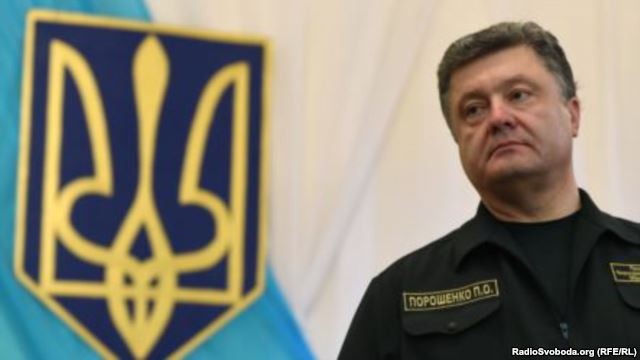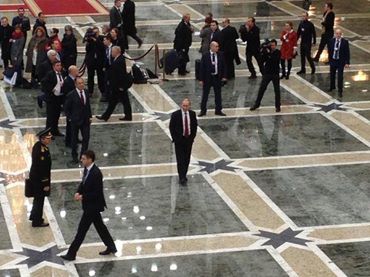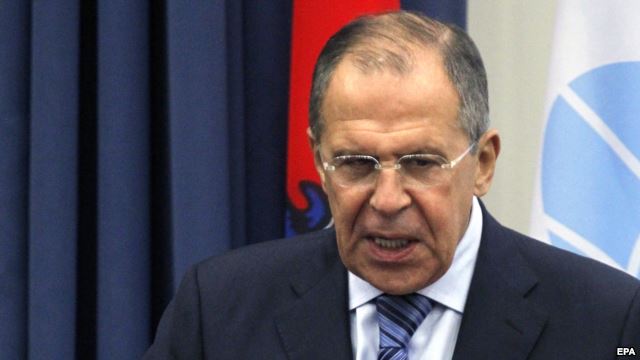As part of his agreements with Russia to end the war in Donbas, on Monday, September 16, President Petro Poroshenko introduced in Parliament two draft laws proposing the amnesty for separatists and militants and the implementation of special self-governance status for occupied districts Donbas for a three-year period. These bills are the price of peace that Ukraine must pay in exchange for ending the Russian invasion.
In conversations with journalists in Kyiv, Ukrainian MPs were careful to emphasize that the draft laws are still very preliminary and that they are likely to be refined and revised before being put up to the vote – which may happen as early as this Tuesday. Nevertheless, here are some of the principal highlights:
- Special status will be in effect for three years and extend only to territories presently controlled by militants;
- All militants and separatists, except those who committed serious crimes or were involved in shooting down the MH17 flight, will be granted amnesty;
- All militants will surrender their arms and release all hostages and seized buildings;
- The government guarantees the freedom to use the Russian language;
- Local elections to be held in occupied territories; officials elected in such elections may not be removed from office prior to expiration of their term;
- Special procedure for appointment of chief prosecutors and judges, with a role for elected local self-governance bodies;
- Central authorities may enter into economic and other agreements with these districts;
- The State Budget will provide for a protected expenditures line item for the development of these districts;
- Occupied districts will be permitted to cooperate with bordering districts in Russia under special border zone cooperation agreements;
- There will be people’s militia units in occupied districts, which will coordinate their activities with local authorities.
Amnesty
Under the first draft law, the government would guarantee amnesty – i.e., “relief from criminal prosecution, conviction, or sentencing for criminal or administrative offenses – to individuals who took part in the events that occurred in Donetsk and Luhansk oblasts.” Specifically, this includes militants who took part in armed groups, officials of self-declared authorities in Donetsk and Luhansk oblasts, and individuals who operated in resistance to the anti-terrorist operation (ATO), and who committed crimes or administrative offenses in the area starting from February 22, 2014.
Militants will be relieved from responsibility only under condition that, within a one-month period from the effective date of the proposed law, they have released all hostages (or have not been holding any hostages), have voluntarily surrendered all weapons and explosives, are not occupying any administrative or other buildings, and are not blocking any government bodies or organizations.
Notably, however, the amnesty provisions would not apply to anyone suspected of or charged with perpetration of serious crimes, as well as those involved in shooting down the Malaysian Airlines MH17 flight or in blocking the investigation into this tragedy.
Once individual eligibility requirements are met, the draft law proposes terminating all active criminal prosecutions (including those in pretrial investigation or trial stages, as well as post-conviction), as well as providing relief from payment of all administrative fines that have already been imposed. The Prosecutor General would provide relevant instructions to local prosecutors within three days of the effective date of the law, who would then have three days to file relevant petitions with the courts; the latter would also have three days to issue a final ruling.
Special self-governance status
The second draft law proposes the introduction of a special local self-governance procedure that would extend to “select districts in Donetsk and Luhansk oblasts, covering the districts, cities, towns, and villages that, as of the effective date of the proposed law, were geographically located within the ATO zone, as defined by the Law of Ukraine “On Fighting Terrorism” (‘designated districts’).”
In addition to reiterating the amnesty guarantees described above, the law would also prohibit “discrimination, persecution, and bringing to liability in connection with the events that occurred in Donetsk and Luhansk oblasts.”
The government would guarantee the right to use Russian or any other language “in public and private life, learning and support of Russian and any other language, their free development, and equality.”
The draft law makes provisions for local elections would be held in designated districts (tentatively scheduled for November 9), with the added safeguard that “the authority of local councils and officials elected in special election set by [Ukraine’s Parliament] may not be terminated prior to the end of their term.”
The draft law would also introduce a special procedure for the appointment of chief prosecutors and judges in designated districts, with special role carved out in this process for local self-governance bodies.
The Cabinet of Ministers and other central executive authorities in Ukraine will be able to enter into agreements with local self-governance bodies in designated districts on subjects of their economic, social, and cultural development.
Under the draft, the Ukrainian government will bear the burden of supporting social and economic development of Donbas. Specifically, such support will involve “the introduction of a special economic regime for business and investment activity (as distinct from the general regime), oriented towards reconstruction of industrial facilities, transportation and social infrastructure, and housing, reorientation of industrial capacity, creation of new jobs, and attraction of investment and credit resources for reconstruction and development of designated districts.”
Additionally, the State Budget of Ukraine will “annually allocate expenditures for state support to social and economic development of designated districts.” The government will guarantee the designation of these expenditures as protected, which means they will not be reduced in the event of general budget sequestration.
The law would also provide for “strengthening and fostering of neighborly relations between territorial communities and local self-governance bodies in designated districts, on one side, and administrative and territorial units of the Russian Federation, on the other side, on the basis of border zone cooperation agreements.”
Finally, the draft law envisions establishing volunteer people’s militia units within the ATO zone, drawn from among the citizens of Ukraine permanently residing in a particular locality. These units would be set up by a decision of the relevant city or village council, with their activity coordinated by the relevant city or village mayor.
Separatists’ reaction
Meanwhile, one of the leaders of self-proclaimed Donetsk People’s Republic, its first deputy prime minister Andriy Purgin was quick to dismiss the proposed draft laws as not applicable to the “republic.”
“This bill is for Ukraine. Laws for Donetsk People’s Republic are made by our own parliament,” said Purgin. He also emphasized that the draft laws can only serve as a starting reference point in negotiations.





